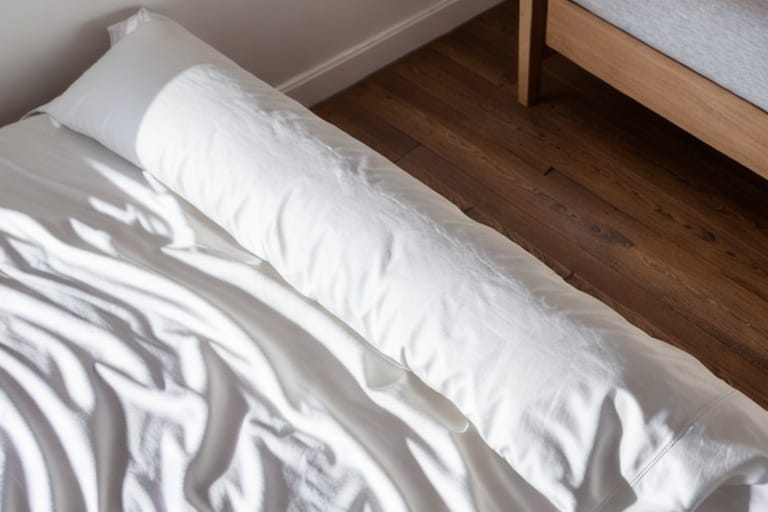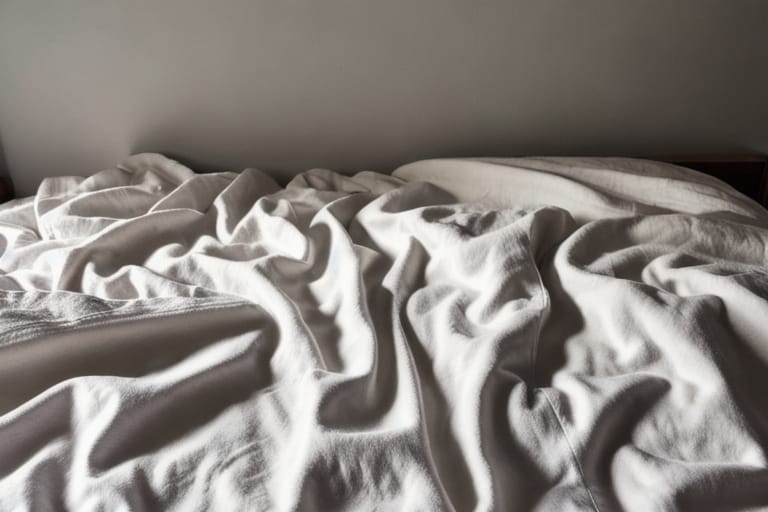Down duvets and comforters are beloved for their lightweight warmth and plush comfort. But one common concern gives some people pause: do down duvets smell?
It’s a fair question. After all, down filling comes from ducks and geese. So it’s natural to wonder—does that mean your bedding will have an unpleasant odor.
The good news is, high-quality down comforters are unlikely to smell when properly cared for. However, there are some key things to understand about the nature of down and how to prevent issues with odors.
In this beginner’s guide, we’ll cover everything you need to know, including:
- What factors cause down bedding to retain smells
- Common odor issues with wet or dirty down
- Proper maintenance and washing of down duvets
- Tips for choosing quality down that resist smells
- Alternatives for those sensitive to down odors
Let’s dive in to shed some light on what makes down bedding smell and how to keep your duvet fresh.
What Is Down and How Is It Used in Duvets?
Before examining what causes down duvets to smell, it helps to understand exactly what down is and how it’s used in bedding.
Down refers to the layer of fine, fluffy feathers found underneath the exterior feathers of ducks and geese. This soft undercoating traps air and provides excellent insulation to keep the birds warm.
For use in duvets and pillows, down is collected as a byproduct from animals used in the food industry. While geese produce higher-quality down, most bedding contains duck down which is more abundant.
Down’s naturally lofty structure and superior insulation properties have made it a prized filling material for duvets, comforters and pillows for centuries. Today, the finest bedding contains Hungarian goose down hailed for its resilience and thermal capabilities.
Why Does Down Absorb Smells?
To understand why down bedding is prone to holding smells, we need to unpack the physical structure and chemical composition of down:
- Lofty Structure: The fluffy strands of down form a breathable, 3D cluster with plenty of space for air, moisture, and odors to become trapped inside.
- Natural Oils: Down feathers are coated with preen oils that have their own natural, animal-like smell.
- Protein Content: Down consists of approximately 88% protein, which can break down over time and grow microbes that cause musty odors.
As you can see, the very makeup of down creates the potential for smell issues to arise if the filling gets wet or dirty.
Do All Down Duvets Smell? Common Odor Causes
Because high-quality down comforters can be quite an investment, many shoppers wonder: do down duvets smell terrible?
The answer is no—not if you choose the right down bedding and care for it properly. Many factors impact odor, including:
1. Wetness and Humidity
Wet down is notorious for giving off a bad smell. When moisture gets trapped in the filling, it creates an ideal environment for microbes like bacteria and mold to grow.
This causes a musty, sour “wet dog” smell that can be very unpleasant. It also damages the insulating capacity of the down.
2. Age and Quality of the Down
Premium down from mature birds tends to be more durable and longer-lasting. Lower grades of down may come from younger birds and can deteriorate faster.
As down comforters age and the feathers break down over years of use, they become more prone to off-gassing organic compounds that cause stale odors.
3. Improper Cleaning
Repeated wash cycles, harsh detergents, and improper drying can strip the natural oils from down that protect the delicate filaments.
This speeds the breakdown of feathers. Residual soap, dirt, and residue from improper cleaning can also trap smells.
As you can see, while quality down fills don’t inherently smell, various factors can lead to odor issues over time.
Next, let’s shed light on some common misconceptions around down and smell.

Clearing Up Down Duvet Smell Misconceptions
If you research the topic online, you may come across various claims about down bedding and smell. Let’s separate facts from fiction:
Myth: All down has an animal-like smell from natural oils
Fact: Some very low-grade down may smell “gamey.” But high-quality down used in bedding has little odor.
Myth: Down comforters smell bad when new
Fact: Off-gassing from new products as they expand is normal. But any odor typically goes away within a few days.
Myth: Feathers and down smell worse than other fills
Fact: When wet, down and feathers can smell bad. But dry down itself has little or no scent.
The key is choosing high-quality materials from reputable brands and caring for them properly through regular cleaning.
Next, let’s look at real-life experiences with down duvet smell.
Do Down Duvets Smell Bad? Real-Life Experiences
Consumer experiences reveal that when cared for properly, high-quality down rarely poses odor issues. Here are some first-hand accounts:
“I was worried a down duvet would smell musty. But I’ve had my goose down comforter for 5 years now and it has no odor at all even after washing.” – Sarah D.
“We’ve used the same Hungarian down pillows for over a decade and they still smell as fresh as when new. As long as you let them air dry thoroughly, smell isn’t an issue.” – Mark W.
However, mishaps can happen, especially involving moisture:
“My cat had an accident on my down duvet once. Even after cleaning, the ammonia smell lingered for months until I finally replaced it.” – Gemma K.
So while the risk of odor issues is low with responsible care, accidents do happen. When they do, it can be difficult to fully eliminate smells from down bedding.
Next, let’s dig into the science behind how down holds onto smells.
The Science of Down Odors: Causes and Solutions
To banish odors for good, it helps to understand the science behind what makes down smell. Main culprits include:
1. Accumulation of Skin Cells and Body Oils
We shed around 1.5 million skin cells per day. When these microscopic flakes build up in down bedding over months of use, the protein-rich flakes provide food for dust mites.
As the mites and decompose and release waste, this generates a musty, stale odor. Thankfully, regular cleaning to remove these contaminants helps down stay fresh.
2. Growth of Microbes like Bacteria and Mold
If moisture gets into down bedding, it creates the perfect conditions for microbes to grow.
A type of bacteria called Bacillus is commonly found in duck and goose down. If these bacteria multiply, it causes a sour, unpleasant smell reminiscent of wet fur.
Meanwhile, mold and mildew growth generates that characteristic musty, stale “wet dog smell”.
Proper drying and airing out of down bedding is key to inhibiting microbial growth and smells.
3. Breakdown of Feather Keratin Proteins
Down consists largely of a protein called keratin that makes up the feathers. Over years of use, these proteins slowly break down releasing volatile compounds that cause off-gassing odors.
This effect worsens when low-grade down decomposes faster or gets damaged through improper washing.
Higher-grade down resists degradation longer, maintaining freshness.
Now that you know the science behind down smells, let’s explore solutions.
Caring for Down Duvets: Washing to Prevent Smells
To keep your down comforter fresh, proper maintenance is key. Here are tips:
- Wash Less Frequently: Only wash down bedding 1-2 times per year unless it becomes stained or smelly. Frequent washing damages down over time.
- Use Gentle Detergent: Skip the bleach and fabric softener. Use a mild detergent without dyes or fragrance.
- Air Dry Thoroughly: Tumble dryers can cook feathers causing harm. Gently squeeze excess moisture then hang dry out of sunlight until fully dry inside and out. This inhibits microbial growth that causes odors.
- Store Properly: Down shouldn’t be compressed tightly for long periods. Store loosely in breathable cotton cases.
Following these simple care principles helps maintain the integrity of the down so it stays fresh.
Next, let’s look at common odor issues and solutions.
Troubleshooting Smells: Wet Dog Odor and Musty Smells
If you notice your down bedding smelling funky, two common odor causes are:
1. Wet Dog Smell
That characteristic stench happens when moisture allows mold or bacteria overgrowth. Dry cleaning ASAP is key.
If washed immediately, wet down can recover sans smell. But if left wet, smells can linger even after washing.
Prevention is best by keeping bedding dry. Using duvet covers also protects from spills and pet accidents.
2. Musty, Stale Smells
This happens as down breaks down over time, releasing compounds that cause off-gassing odors.
Letting bedding air out in sunlight regularly can help neutralize odors between washes. Consider replacing aging bedding.
Now that we’ve covered troubleshooting smell issues, let’s explore solutions.
Banish Duvet Smells: Covers, Airing Out and Cleaning
Here are handy tips to keep your down bedding fresh:
- Use Duvet Covers: An extra layer protects down from body oils and spills while being easier to launder more often.
- Air Out in Sunlight: Allowing down to air out naturally helps air circulation to reduce odors.
- Dry Clean Annually: Take bedding for professional dry cleaning every year or two to deep clean and revitalize.
- Replace Regularly: Plan to replace down comforters every 5-10 years depending on use.
With proper care, airing out and timely replacement, foul odors can be prevented.
For those needing an extra level of freshness, professional cleaning offers robust deodorizing.
Professional Down Cleaning & Sterilization
While home washing maintains freshness short-term, professional services provide intensive deodorizing and sterilization.
Benefits include:
- High-heat drying reaching over 212°F to kill microbes
- UV light sterilization to eliminate mold and bacteria
- Ozone treatment to neutralize difficult odors
- Hypoallergenic cleaning solutions to remove residues
- Repair of small rips or holes
This comprehensive cleaning restores loft and extends the life of down bedding. Costs range $100-300 depending on the item’s size.
A common question, however, is whether formaldehyde is used when professionally cleaning down items.
The Issue of Formaldehyde
In the past, some dry cleaners treated down with the chemical formaldehyde to sterilize bedding.
However, formaldehyde is a known human carcinogen linked to health issues.
The good news is most professional cleaners now use alternative disinfectants that don’t pose health risks. These include hydrogen peroxide, ozone gas, and UV light.
Ask any potential cleaner which sterilization methods they use. Avoid any still using formaldehyde.
For those wanting to avoid any chemicals, natural down alternatives exist.
Down Alternative Duvets: Wool and Synthetic Fills
For sleepers sensitive to down or feathers, odor-resistant alternatives include:
Wool Duvets and Comforters
- Naturally moisture-wicking Merino wool resists odors
- Wool is hypoallergenic and chemical-free
- Provides warmth yet breathes well to dissipate humidity
- Costs $$-$$$ (similar to down bedding)
Synthetic Fill Comforters
- Polyester fibers are machine washable and dry fast
- Resists dust mites, allergens and maintains shape
- Affordable $ – $$ pricing
- Not as warm or lightweight as down
Both offer comfy, odor-free sleeping options.
As we wrap up, let’s recap some key tips for choosing the best down bedding.
Shopping for Down: How to Select Quality Products
When buying down bedding, here are tips for getting longevity and value for money:
- Seek fine, mature Hungarian goose down for resilience
- Choose a high fill power over 600 for better loft
- Check the thread count of the shell fabric – 400 thread count cotton or higher breathes best
- Read cleaning guidance to understand optimal care requirements
- Consider ethical sourcing certifications like Responsible Down Standard
Investing a bit more upfront in premium materials pays off long-term in superior performance, comfort and convenience.

Conclusion: Enjoy Fresh, Cozy Down Bedding
While it’s common to wonder “do down comforters smell?”, quality bedding should have little or no odor when cared for properly.
Avoiding moisture and washing gently at home keeps down fresh between professional cleanings every year or two. And covers provide inexpensive protection.
By understanding down’s unique properties, preventing microbial growth, and addressing smells promptly, you can enjoy luxuriously comfy bedding for years.
Coupled with airing out bedding regularly and periodic replacement as it ages, you’ll be catching sweet Z’s in your fresh, fluffy down comforter or duvet in no time.
Frequently Asked Questions
Do down duvets have an odor?
Quality down duvets have very little inherent odor. However, odors can develop over time if the down gets wet or dirty which allows for microbial growth. With proper care and washing, though, most good down comforters should maintain a fresh scent.
Why does my down duvet smell musty?
If your down bedding gives off a stale, musty smell, the likely culprit is either buildup from skin cells and body oils providing food for dust mites or the growth of mold, bacteria or mildew from moisture trapped in the down. Proper drying and washing along with regular airing out in sunlight should eliminate the musty odors.
How do I get unpleasant smells out of my down comforter?
To remove bad odors from down bedding, start by washing the comforter with a mild detergent, rinse thoroughly, and air dry completely. For tougher smells, add a cup of baking soda or white vinegar to the wash to help neutralize odors. Airing out the comforter outside can also help freshen it.
Should down duvets be dry cleaned?
Down duvets should be dry cleaned every year or two to deep clean and revitalize the down to maintain comfort, loft and freshness. Professional dry cleaning uses high heat, UV sanitizers and odor neutralizers to thoroughly eliminate bacteria, allergens, and stubborn odors that can build up over regular use. Just be sure they don’t use harsh chemicals like formaldehyde.
Can you get down bedding that resists odors?
There are certain types of premium down fills like Hungarian goose down that maintain integrity and resist odor longer than lesser quality varieties. Responsibly-sourced down certified to industry standards for animal welfare and sustainability is optimal. Options like Oeko-Tex certified down have also been tested rigorously for harmful substances to ensure certified clean freshness.








